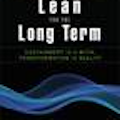I’ve been involved in manufacturing since 1967, initially as a manufacturing engineer in a precision machine shop and later managing multimillion dollar programs. Not to brag on myself, but I’ve met many smart people!
Initially our goal was limited to meeting quality requirements, by getting through quality inspections and testing in order to deliver on time that month. It was a pretty simple life then, but we didn’t know it.
A little later, I managed the manufacturing services department of a geophysical exploration company, and my boss asked me to analyze the flow of our hydrophones and ocean-going seismic cables. Not knowing what he meant by flow, I went to our final assembly area to look around. This was way before Gemba was a word we had heard.
I found that, yes; we were building in batches because of the large setup times--and my boss knew that.
So began my career of looking for continuous improvements.
Now, quite a few years later, we have all used the broad words for change such as Lean, continuous improvement, Toyota Production System, and before that Total Quality. Still, despite the widespread use of the terms, I'm concerned that perhaps they are being used without a full understanding.
Toyota has been given a lot of press and acknowledgement for their approach to creating TPS, and rightly so. But in today’s implementation of Lean, how many organizations buy into the total culture change that TPS and Lean really require?
It seems to me that, too often, companies run a pilot in their assembly or machine shops to see if it works. If they get good results, they train a few manufacturing employees on 5S, 3P, Poke Yoke, the seven wastes and all the other tools we know.
Usually if done well, there are immediate cost savings from reducing waste, so Lean tools are expanded across the manufacturing department. Cost savings become the key metric looked at by management. But after a few years, the low hanging fruit has been diminished and cost savings plateau or recede. Then management asks, “Ok, we’ve done Lean, what’s next?”
This is what I call a “manufacturing lean project,” which can lead to short term gains, but no transformation.
Let’s look at what a Lean Transformation entails. By looking at TPS, the two pillars it is built on are easy to identify:
1. Continuous Improvement
- Part of the culture and expectations
- By everyone, every day
- In every department, from the top down
- Management goes to the Gemba to view the work being done
2. Respect for People
- Management asks questions as a form of mentoring, so that workers decide for themselves what is best.
- Each worker is unique and should be treated with respect and helped by management to fulfill their capabilities and dreams.
- Communication to all about the companys’ goals, plans and results assures that everyone is on the same page.
These two pillars are true to Lean as well. Many lean practitioners may not understand that the "Respect for People" pillar is the basis for everything else--trust, motivation, continuous improvement and outstanding performance.
It’s a big step to adopt a Lean strategy as the Lean Management System for the entire company, but it’s important that everyone has the same goals and expectations, i.e., one language. For example, management should be teaching the Lean classes and frequently inspecting for both continuous improvement and respect for people every day! Then everyone knows it’s important.
Some enlightening questions about a Lean Transformation
- Does everyone in the company understand that this is a long-term commitment?
- Does the company have a Lean Management System in place that defines these expectations and live by it daily? Research identifies this as a best practice for companies that have been on the Lean journey for 20 to 30 years.
- Does management have standard work? Yes, this includes top management, marketing, engineering, purchasing, quality and everyone else.
- Is the company continually looking at the customer’s needs today and tomorrow? For example, is the company willing to change what works today for what will work tomorrow?
Ask yourself these four questions to see if your company is on a Lean Transformation or just doing a Lean manufacturing project.
About the Author

Bill Baker
President/Owner
Bill has been a rocket performance engineer, manufacturing engineer, finance executive and manufacturing manager at Texas Instruments, University of Texas at Dallas and Raytheon spanning 43 years.
Also he has served as a keynote speaker, workshop leader, consultant and author with expertise in Lean Enterprise, excellence criteria, benchmarking and knowledge management.He is the co-author, with Ken Rolfes, of Lean for the Long Term (Productivity Press, 2015).
